The BGG Rating Scale
06 Aug 2024There’s no single agreed upon rating system for all things. Sometime we use a 5 star scale. Sometimes a 10 point scale. Sometimes A-F letter grades (where maybe “S” is part of system). Sometimes thumbs up or thumbs down. Sometimes a heart vs. the absence of one.
Different rating systems may be preferred depending on how much time we spend with media. A song, averaging around 3 minutes long, probably doesn’t require a detailed 5 star scale; a simple “heart or not” system is plenty. Movies we spend a couple hours with, so they seem to warrant more. Video games may get a dozen or more hours, and that seems more likely to land a 10 point scale. But hey, each reviewer is going to do their own thing. And review aggregation sites are going to turn that into number soup. But there is some rhyme to which rating scales we pick for which things.
The predominant resource on board games is Board Game Geek, and BGG asks its users to rate games on a 10 point scale. Not only that, but they provide suggested definitions for those values.
10 - Outstanding. Always want to play and expect this will never change. 9 - Excellent game. Always want to play it. 8 - Very good game. I like to play. Probably I’ll suggest it and will never turn down a game. 7 - Good game, usually willing to play. 6 - Ok game, some fun or challenge at least, will play sporadically if in the right mood. 5 - Average game, slightly boring, take it or leave it. 4 - Not so good, it doesn’t get me but could be talked into it on occasion. 3 - Likely won’t play this again although could be convinced. Bad. 2 - Extremely annoying game, won’t play this ever again. 1 - Defies description of a game. You won’t catch me dead playing this. Clearly broken.
You may notice that this scale is mostly oriented around desire to play. That’s a reasonable index, but not the only one. It’d be weird if we primarily reviewed movies based on your interest in seeing them again. We fully accept that a movie can be seen once and never returned to, but still be great. But as physical objects that take up space in your home, board games seem held to this standard of “how much value are you getting out that shelf space?”
So, how do I rate my games? Since BGG has definitions for their rating system, I try to adhere to that as closely as possible when rating on their site. But there are other factors. It’d be uninteresting to me to have a perfect 10 game only be a function of endless desire to return to it. How the game makes me feel? What memories does it has the capacity to form? Does community flow from the game, can it make bonds? And yes, is it an appropriate price for the quality of experience? All of this factors in.
So, here are some representative examples for each rating.
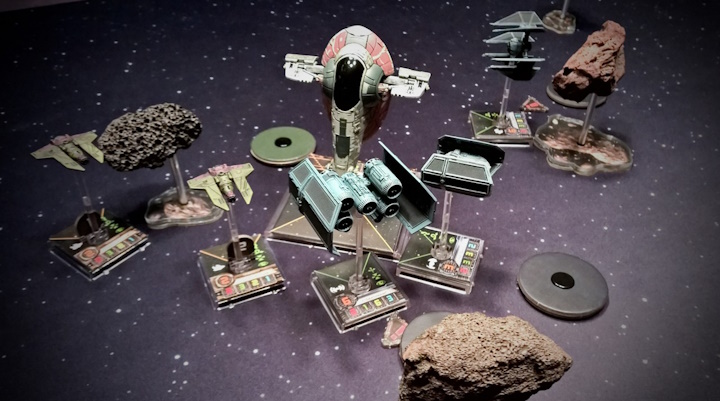
10
Outstanding. Always want to play and expect this will never change.
Anything at this rating has to be truly special. Dare I say… meaningful? Impactful, sustaining, and something that really captures my identity.
Star Wars: X-Wing Miniatures Game. I have played close to two hundred matches of this game. I have played in tournaments. I have made various after-market customizations to enhance my experience playing the game. I followed its evolution over many years, eagerly tracking every news article. I have fond memories of playing with specific people and leaning into the whole experience of this game. It’s captured my imagination and brought me real joy. It’s a 10. What else could it be?
Another example: Skull, in my opinion, a perfect game.
9
Excellent game. Always want to play it.
This rating is only for great games that stand above most, but maybe don’t quite get into the truly rarified air of my greatest of all time.
Just One. I’ve never not had a delightful experience playing this simple word game. It works for kids and adults. You can drop in and out. It doesn’t exactly capture my imagination and live rent free in my head. But it’s a reliable good time. Incredibly solid.
Alternate example: Kemet, a heavier game by comparison that has shown itself to hold up to dozens of plays.
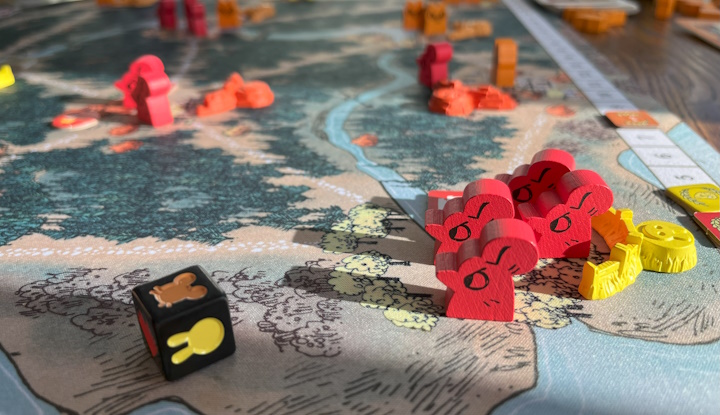
8
Very good game. I like to play. Probably I’ll suggest it and will never turn down a game.
A game that garners an 8 is truly solid. It’s going to be beloved by me, but not entirely unconditionally.
Root. I can’t picture myself turning down a game of Root. It’s such an interest piece of design and art. But for sure it’s not for everyone. It can be hard to teach (although not as hard as people think). I’ve heard it described as too clever for its own good. But I love it.
Alternate example: King of Tokyo is worth acknowledging as a popular late night game with many of my friends. I’ve cooled on it, but only after it wracked up almost a hundred plays.
7
Good game, usually willing to play.
I own a lot of 7’s. They’re good. They’re just not quite great for one reason or another.
Ra. I very much enjoy this classic auction game. But I’ve seen firsthand how the random swings and missed opportunities can really frustrate and alienate other players. I think my experience with this one would be rated higher than others, but it’s not a solo game and I have to recognize that something keeps it from landing.
Alternate example: Android: Infiltration. Is a push-your-luck heist game that has shown surprising longevity. It has real flaws, but it’s got some magic too.
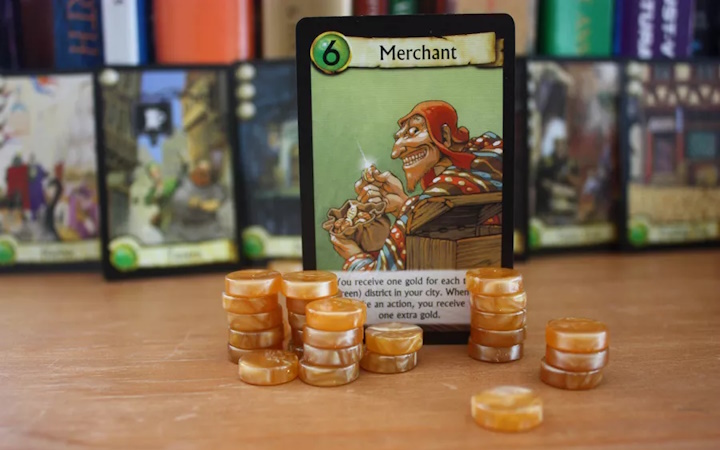
6
Ok game, some fun or challenge at least, will play sporadically if in the right mood.
A lot of games are going to sit at this rating. I’ll play them if someone else is feeling drawn to it, but I’m not often going out of my way.
Citadels. I’ve certainly had fun with this one. But it’s got some mean edges. And the building aspect is pretty thin. There are other role selection games that are often going to be a better use of my time (like Libertalia or Mission: Red Planet).
Another example: Kingdomino is perfectly fine. It has an interesting drafting mechanism and is easy to teach. But it’s not pulling me in.
5
Average game, slightly boring, take it or leave it.
Average games are average. There’s nothing terrible here, but we deserve better than average for our time.
Century: Spice Road comes to mind for this rating. It’s a bunch of resource conversions and recipe fulfillment. It’s fine. It’s decidedly average.
Another example: Catan was once exceptional, and is now average in the robust feast of modern board games we have available today.
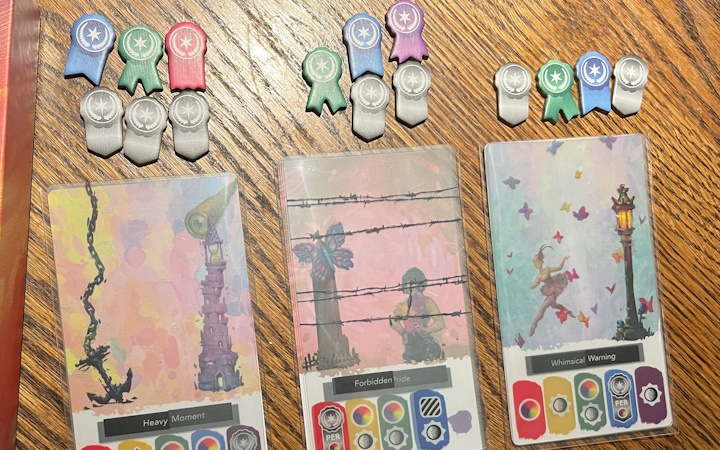
4
Not so good, it doesn’t get me but could be talked into it on occasion.
A 4 rating means is not for me but is for someone.
Talisman is not something I’m interested in. It’s a role-to-move with fantasy adventure theming. I’ve never felt like winning was the product of clever play.
Another example: Canvas fell flat for me as a component gimmick without much game behind it.
3
Likely won’t play this again although could be convinced. Bad.
If a game is a 3 then that means I’m pretty sure it’s terrible but I hold a small sliver of hope that I’m wrong.
Munchkin is not my jam. The entire experience devolves into tearing someone down in their moment of joy. It has a humor to it, but not enough to make me want to play.
Another example: Steam Up: A Feast of Dim Sum has the most lovely components with its steam trays. But I found the act of watching other players rotate my agency away turn after turn infuriating.
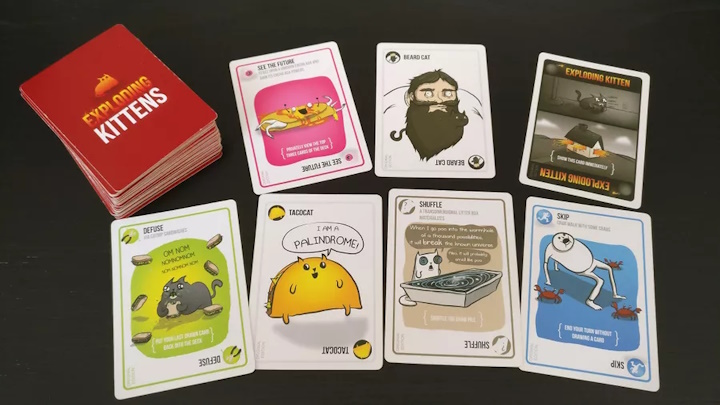
2
Extremely annoying game, won’t play this ever again.
To earn a 2 rating you need the confidence of being never worth another look.
Exploding Kittens has its audience. To me it’s just some random shit happening. No thanks.
1
Defies description of a game. You won’t catch me dead playing this. Clearly broken.
I’d guess that most 1 ratings on BGG are hateful review bombing, not actual thoughtful criticism. I’ve only ever given it out for this literal description… is this even a game? Am I missing something because it doesn’t even seem to function.
Doggy Go! is the only example I found where I gave out a 1. I grabbed it from a convention library and literally couldn’t figure out if it was a game or just some objects you were expected to use to find your own path to fun.